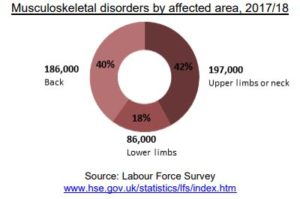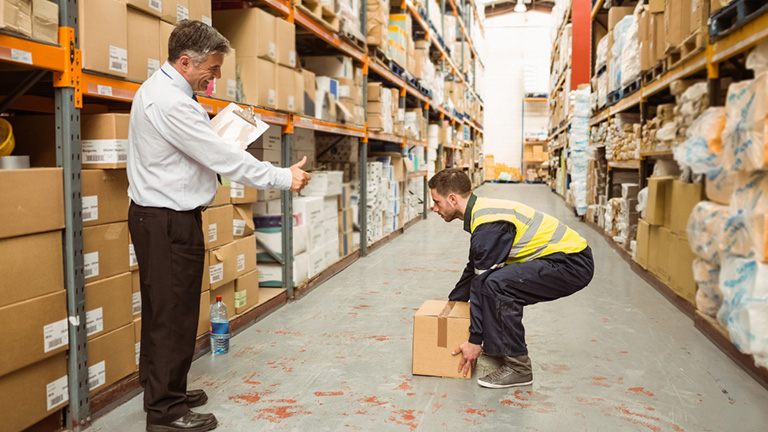What is manual handling?
Manual handling is classed as any transporting or supporting of a load by one or more people. The term is used to cover a wide variety of activities including lifting, lowering, pushing, pulling and carrying. These types of tasks are carried out regularly in the workplace and if not done correctly can cause injury which will impact both the injured employee and the employer.
What are the risks of poor manual handling?
Manual handling can be required anywhere in the workplace and the risk of injury is increased when there is an existing or previous injury, or when heavy manual labour, awkward postures and repetitive movements of arms, legs and back are carried out.
Some may think an injury occurring from incorrect manual handling may seem trivial, or superficial, but often these types of injuries can have long term effects.
Short-term injuries
Injuries such as cuts, bruises, sprains, tears and muscle strain can be easily obtained when moving loads at work. They are usually caused by sudden or small unexpected accidents like losing grip and dropping a load or falling while carrying a load. Although some injuries from manual handling may heal in a reasonably short space of time, they can still cause extreme pain, fatigue and stress to the individual and their family.
Musculoskeletal disorders (MSD)
MSD is a broad umbrella term for many types of aches and pains that can be caused by incorrect manual handling over time. They are categorised into three types:
- Upper limb disorders
- Lower limb disorders
- Back pain
They mainly involve damage to the musculoskeletal system of the body, including muscles, tendons, bones, joints, ligaments, nerves, and blood vessels –usually caused by long-term, gradual wear-and-tear as a result of repetitive strenuous activities. In 2017/18, there was over 469,000 workers suffering from a work-related MSDs, and 6.6 million working days were lost as a result of a work-related MSD.
The majority of work-related musculoskeletal disorders are caused by poor manual handling practices, particularly tasks that involve:
- Heavy or awkward loads (loads may be animate e.g. people or animals, or inanimate e.g. boxes and tools)
- Twisting, turning, and bending the back, neck, or whole torso
- Hard-to-reach areas that require stretching
- Working in a cramped environment with unstable flooring

Did you know?
It’s a myth that back pain is only associated with jobs that involve lots of heavy or repetitive lifting; it’s also common in people with sedentary jobs e.g. office workers, commercial drivers, and jobs where the employee has to stand in one place / hold a posture for long-periods e.g. production line workers.
Mental health issues
Obtaining an injury from poor manual handling can have a major effect on an individuals mental health. Dealing with long term injuries that are difficult to bear, and being out of work can negatively affect mental health. Long term stress, depression and anxiety are often a result in individuals who suffer from work related MSD’s.
This is why it is essential that proper training in manual handling is given in the workplace. The prevention and control of work-related musculoskeletal disorders is a major priority for the Health and Safety executive, and it should be a major priority in your workplace too.
IOSH Manual Handling Train the Trainers Course
Our 3 day IOSH accredited course is ideal for staff who wish to be the in-house manual handling trainer. Instead of sending numerous staff on a manual handling course, why not train one individual who can then carry out training as and when needed in your own premises?
We recently received great feedback from Coco-cola Hellenic Bottling Company who completed this course:
“‘Brilliant course. Lisa created a very relaxed environment for training, putting everyone at ease. Her knowledge of the subject, combined with training experience and real life examples has equipped me well to create and deliver this course internally”
To learn more about this course, click here or give us a call on 028 90 256 482.

